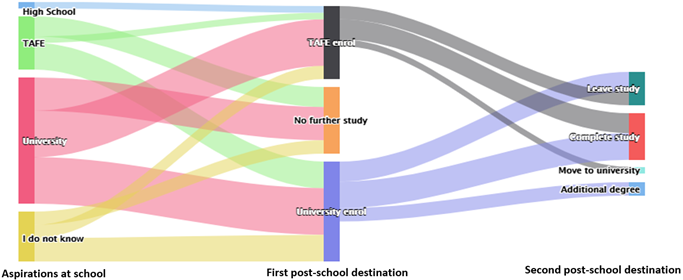Helping Young People Navigate the Post-School Transition
08/08/2022
Felicia Jaremus is a postdoctoral researcher with the Teachers and Teaching Research Centre at the University of Newcastle. The following information comes from a research project led by Felicia and funded by the National Centre for Student Equity in Higher Education.

High school students want more information about post-school options including alternative pathways into university, vocational education opportunities and to hear from other young people who have recently navigated life after school.
My latest research suggests that young people need to be prepared with the information to access a variety of post-school pathways, even ones they may not be intending on accessing.
What do young people do after school?
We surveyed 52 school students and again one- to five-years after they completed school to find out about their career and educational goals. Almost two thirds of students (64%) wanted to go to university and very few indicated that they would pursue vocational education (TAFE) (16%) or no further study (2%) when they were at school.
After leaving school, however, many more young people went to TAFE (24%) or completed no further study (22%) than anticipated. Only about half (58%) of the students who aspired to attend university actually did so after school.

What do young people wish they had known?
As well as surveys, we interviewed 21 young people to gain an in-depth understanding of the pathways they took and the choices they made since leaving school and how these related to their aspirations at school. Each of these young people were given the opportunity to reflect on what they wish they had known, or had been told about, when they were at school. Their advice may help schools and school communities better prepare future young people for life after school.
- There are different ways to enter university other than the Australian Tertiary Admissions Ranking (ATAR): “I think with the pressure in schools on you know, ATARs and that sort of thing, and they have to put that pressure on because they want you to do well, but it sort of develops a sort of you know, develops a stigma around well if I don’t do Year 11 and 12, HSC, then I can’t get into university, without [young people understanding] there’s actually [alternative] pathways.” (Myall, youth program facilitator, no post-school education)
- Hearing from students who have recently left school: “I would have been happy if they asked me in the first year to come down and talk to some of the students. I think they should do stuff like that, I think, more of a first-hand experience than just looking at the book and [seeing that] you need a 96 ATAR.” (Ahmad, architecture student, university student)
- Not everyone completes their degree and jobs after university can be hard to get: “A lot of friends felt pressure that they had to go to uni straight away and they’ve ended up either not using their degrees or dropped out or changed courses a few times… A lot of my friends are sort of only just now in their final years of uni or just finished uni but I’ve already been working full time for a few years now.” (Audrey, veterinary nurse, TAFE certification)
- It’s ok not to go to university: “Even just hearing a teacher say, and I guess say more than once, if you don't want to do a certain course of action that's okay, I guess, particularly with further education. I guess some teachers might have implied it but it was just overwhelmingly one sided and it would just have been nice to hear, like, if you don’t want to do [university] then that’s okay.” (Lucky, financial planner, university student)
- There are many career options, including those that don’t require a university degree: “I think that’s very important just showing that there are alternate pathways – you don’t just have to go to university and become a lawyer or a doctor or do those things that seem really unachievable to a lot of people. You can live a very good life having very achievable goals through getting something like a trade, something that you enjoy doing, being hands-on, building houses.” (Frank, law and arts student, university student)
- Mental health and wellbeing is really important when considering the future: “I lost motivation in Semester 2 as I did my first practical placement, which I didn’t enjoy very much. It was very confronting. I had a nurse tell me they were killing themselves for the job and I had more cons than pros in the career. I decided to take a leave of absence from uni. I think a lot of factors went into this, such as I had a lot of people close to me pass away. I struggled with uni and work-life balance. I worked causally but I would do 38 hours most weeks. I liked earning money as I am not entitled to anything from Centrelink. My friends all had full time jobs and had weekends off, where[as] I worked every weekend which was hard. I then decided I would not continue with uni.” (Sara, medical receptionist, left university prior to completion)